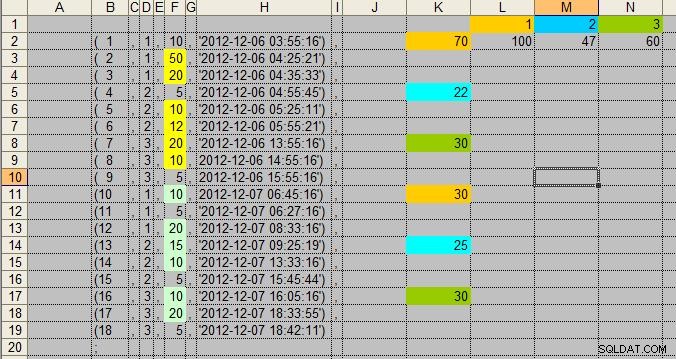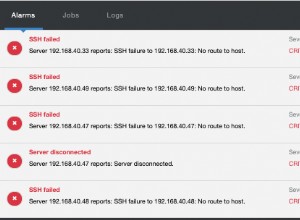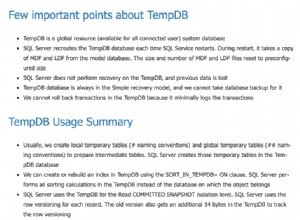Dai un'occhiata al codice seguente, se la tua risposta al mio commento è yes :) Dato che i tuoi dati sono tutti nel 2012 e nel mese di novembre, ho preso giorno.
- SQLFIDDLE campione
Domanda:
select y.id, y.userid, y.score, y.datestamp
from (select id, userid, score, datestamp
from scores
group by day(datestamp)) as y
where (select count(*)
from (select id, userid, score, datestamp
from scores group by day(datestamp)) as x
where y.score >= x.score
and y.userid = x.userid
) =1 -- Top 3rd, 2nd, 1st
order by y.score desc
;
Risultati:
ID USERID SCORE DATESTAMP
8 2 8.5 December, 07 2012 00:00:00+0000
20 3 6 December, 08 2012 00:00:00+0000
1 1 5 December, 06 2012 00:00:00+0000
Sulla base dei tuoi ultimi aggiornamenti alla domanda. Se ne hai bisogno per utente per anno/mese/giorno e poi trovi il massimo, puoi semplicemente aggiungere una funzione di aggregazione come sum alla domanda di cui sopra. Mi sto ripetendo, dal momento che i tuoi dati di esempio sono solo per un anno, non c'è un gruppo di punti per anno o mese. Ecco perché ho preso giorno.
select y.id, y.userid, y.score, y.datestamp
from (select id, userid, sum(score) as score,
datestamp
from scores
group by userid, day(datestamp)) as y
where (select count(*)
from (select id, userid, sum(score) as score
, datestamp
from scores
group by userid, day(datestamp)) as x
where y.score >= x.score
and y.userid = x.userid
) =1 -- Top 3rd, 2nd, 1st
order by y.score desc
;
Risultati basati sulla somma:
ID USERID SCORE DATESTAMP
1 1 47.5 December, 06 2012 00:00:00+0000
8 2 16 December, 07 2012 00:00:00+0000
20 3 6 December, 08 2012 00:00:00+0000
AGGIORNATO CON IL NUOVO CAMPIONE DI DATI SORGENTE
Simon, per favore dai un'occhiata al mio campione. Poiché i tuoi dati stavano cambiando, ho usato i miei. Ecco il riferimento. Ho usato puro ansi style senza alcun over partition o dense_rank Nota anche che i dati che ho usato stanno ottenendo i primi 2 e non i primi 3 punteggi. Puoi cambiare di conseguenza.
Indovina un po', la risposta è 10 volte più semplice della prima impressione che hanno dato i tuoi primi dati....
SQLFIDDLE
Interroga a 1:-- per la somma dei primi 2 per utente di ogni giorno
SELECT userid, sum(Score), datestamp
FROM scores t1
where 2 >=
(SELECT count(*)
from scores t2
where t1.score <= t2.score
and t1.userid = t2.userid
and day(t1.datestamp) = day(t2.datestamp)
order by t2.score desc)
group by userid, datestamp
;
Risultati per la query 1:
USERID SUM(SCORE) DATESTAMP
1 70 December, 06 2012 00:00:00+0000
1 30 December, 07 2012 00:00:00+0000
2 22 December, 06 2012 00:00:00+0000
2 25 December, 07 2012 00:00:00+0000
3 30 December, 06 2012 00:00:00+0000
3 30 December, 07 2012 00:00:00+0000
Query finale:-- per tutti i due giorni i primi 2 somma per utente
SELECT userid, sum(Score)
FROM scores t1
where 2 >=
(SELECT count(*)
from scores t2
where t1.score <= t2.score
and t1.userid = t2.userid
and day(t1.datestamp) = day(t2.datestamp)
order by t2.score desc)
group by userid
;
Risultati finali:
USERID SUM(SCORE)
1 100
2 47
3 60
Ecco un'istantanea dei calcoli diretti dei dati che ho usato.





